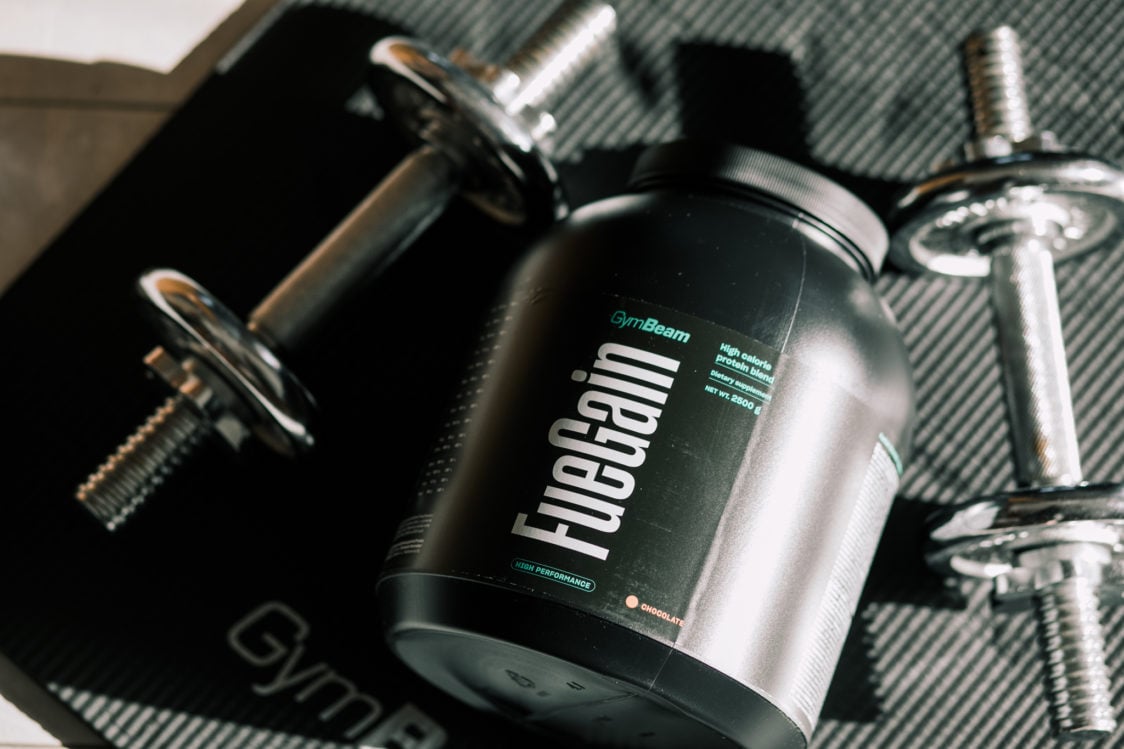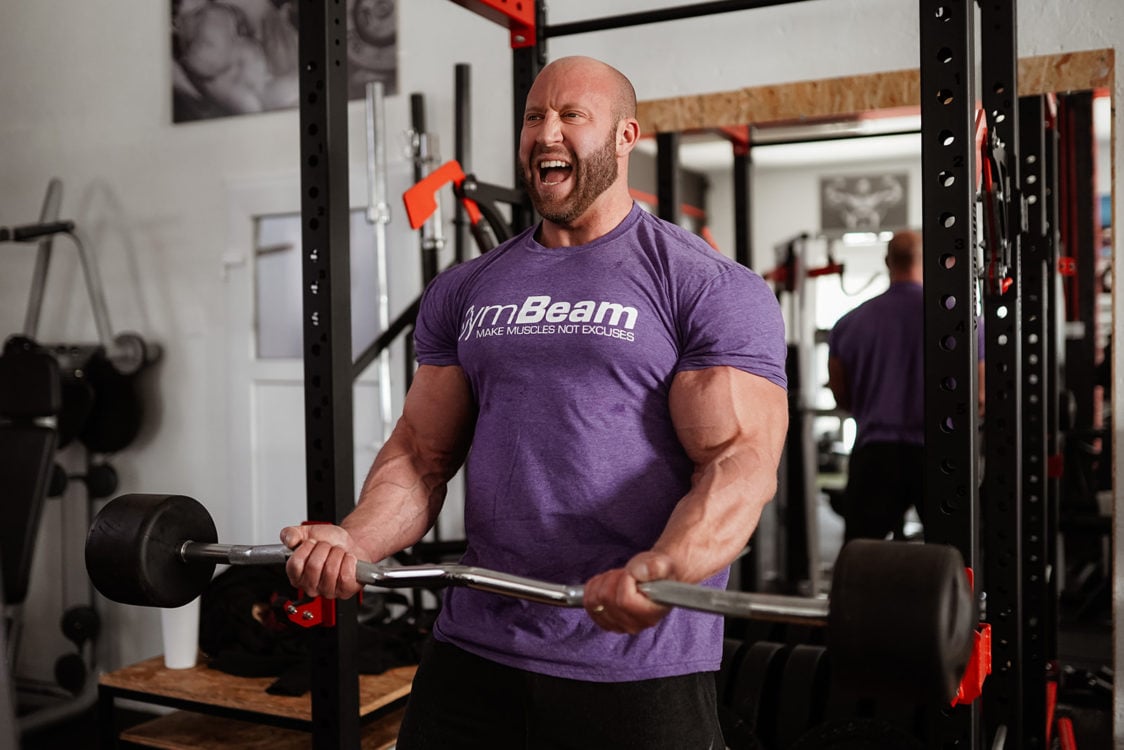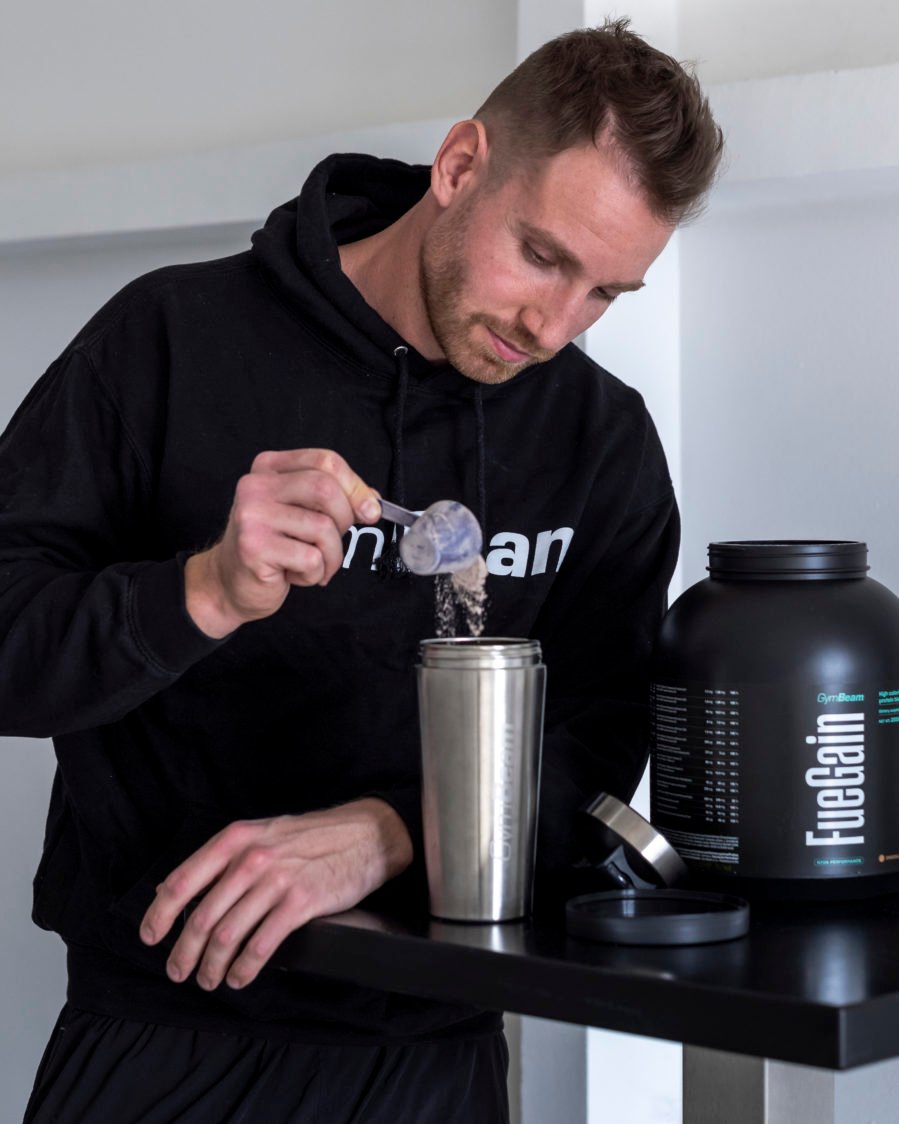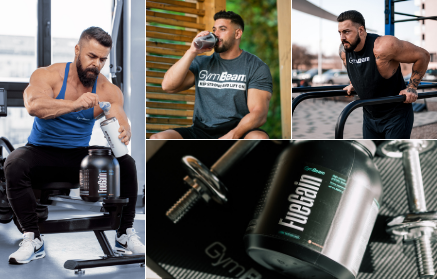Table of Contents
Each of us has different fitness goals. One of the most common ones is to lose excess fat. However, there are also people who would like to gain weight and mass. Ideally not fat, but muscle. This is mainly associated with strength training, which also requires the intake of a sufficient amount of calories. In this case, of course, diet is important.
However, sometimes even with a rich diet you end up having a problem fulfilling your caloric intake. Especially if you feel that your metabolism runs extremely fast and large portions of food can be challenging for you. This is where the clever use of supplements comes into play, and in this case, a quality gainer does the best work. It offers an effective way to increase caloric intake and supply the body with the quality nutrients needed for muscle growth. Have you ever wondered how to choose the right one from the wide range of gainers? Our article will be more than happy to offer you advice.
What is a gainer and how does it differ from protein?
As we mentioned at the beginning, gainers are sought by those who want to gain muscle mass, increase their caloric intake and thus cover the energy requirements of a physically demanding lifestyle. At first glance, it looks very similar to a protein powder. The main difference between them is in the ingredients. Gainer is an effective blend of nutrients, rich not only in protein, but mainly in carbohydrates. In some cases, it also contains other ingredients, such as key vitamins, minerals or digestive enzymes. It also often contains creatine or other amino acids to support muscle growth or sports performance.
The ratio of carbohydrates to proteins in gainers can climb up to 5:1, depending on their type. You can also come across the terms soft and hard gainer. These are gainers with either a smaller or larger proportion of carbohydrates and sugar. The latter also have a higher calorie content. [1] [7]

The difference between a gainer and a protein is best compared by looking at their composition. You can see a comparison of the nutritional values of one serving of protein ( FueSix ) and gainer ( FueGain ) in the following table:
| Nutritional values | Protein Fuesix(1 dose = 30 g) | Protein FueSix (100 g) | Gainer FueGain(1 dose = 126 g) | Gainer FueGain (100 g) |
|---|---|---|---|---|
| Energy value | 422 kj / 100 kcal | 1408 kj / 332 kcal | 1975 kj / 466 kcal | 1530 kj / 361 kcal |
| Fats | 0.4 g | 1.3 g | 2.2 g | 1.7 g |
| Of which saturated | 0.3 g | 0.9 g | 1.6 g | 1.2 g |
| Carbohydrates | 3 g | 10 g | 76 g | 59 g |
| Of which sugars | 2.3 g | 7.5 g | 23 g | 18 g |
| Proteins | 21 g | 70 g | 36 g | 28 g |
The FueGain gainer is also enriched with micronized creatine monohydrate, fibre, BCAA, vitamins and minerals.
A typical serving of a gainer can average 500 kcal. However, among them are also some with caloric content twice as high as the recommended intake. In their composition we can find a lot of carbohydrates and less fat. This is because it is the optimal layout of macros if your goal is to gain weight.
In general, when losing weight, we reduce overall calorie intake, most often from both fats and carbohydrates. On the other hand, when gaining weight, we increase the calorie intake, ideally using carbohydrates. They are the main source of energy for cells and affect the secretion of the anabolic hormone – insulin. [3]
If you are interested in the topic of healthy gaining, be sure not to miss our article 10 Tips for Healthy Weight Gain.
You might be interested in these products:
Gainer as a source of energy for gaining (muscle) mass
As already mentioned, gainers are mainly rich in carbohydrates. These are the primary source of energy. If you are trying to gain weight or muscle mass, you need to consume more calories.
After a hard workout, it is important for your muscles to recover as quickly as possible. And carbohydrates are the best way to store glycogen – a source of fuel. Of course, proteins are also very important as they function as the basic building blocks of muscles, helping them to grow. [2] [4]
The advantages of using a gainer include [7][8][9]:
- High caloric content from high quality macronutrients
- High proportion of carbohydrates and proteins
- Help with building muscles
- Supplying the body with energy
- Easy way to get enough energy (calories)
- They often contain vitamins, minerals and fibre
For most people, increased carbohydrate intake means that they have more energy. They can train more, while maintaining high intensity and difficulty of the exercise. This is what is needed to maximize potential muscle gain.

Here, however, it should be noted that the increase in mass also depends on the method of exercise and the overall diet. If those athletes who engage in intense exercise do not receive enough carbohydrates, it is likely that this will have a negative effect on their performance and regeneration. Many also worry about gaining fat when using a gainer. The fact is, however, that this is determined by a person’s total calorie intake and expenditure, not the gainer itself. [5] [11]
If you want to know more about the importance of carbohydrates, we recommend our article Are Post-Workout Carbohydrates What You Really Need?
When and how is it best to use gainer?
Using gainer actually depends on your dietary goals and training schedule. To make it more effective and help you build muscle, it’s best to take it [12][13][14]:

- before training: to increase your energy levels, you should consume easily absorbed carbohydrates 30-60 minutes before training. Gainer can be the perfect way to get them.
- after training: this is the time when you just used up a large amount of energy and your glycogen levels decreased, and thus it needs to be replenished.
- before sleep / in the morning: if your diet lacks nutrients, your body may get to a catabolic state because it receives no nutrition for more than 6 hours during sleep. Therefore, it is very important to provide it with nutrients before bed and immediately after waking up. This is especially important if you are not used to having breakfast, or if you have breakfast later in the day and it has been many hours since your last meal. Drinking a high-quality gainer can have a great effect on this particular issue.
- any time during the day: especially if you are so busy during the day that you can’t eat. In those situations you can use a high-quality gainer, ideally in the form of an all-in-one blend, once or twice a day as a meal replacement, which will help you fulfil your energy intake.
And how should you use a gainer? A good way is to mix it with water. However, if you want more calories and nutrients, you can replace water with milk. The advantage of this combination is also better taste.
Even (some) women don’t have to be afraid to use a gainer
As stated above, using a gainer is recommended as an additional source of calories to gain weight. This fact can frighten many women. However, among them are those that have slightly different fitness goals. Using a gainer can work well especially for ladies who like to spend their time actively.
That does not include just an exercise in a gym, but also CrossFit, strength and endurance training, martial arts or even triathlon. Gainer is also a great choice not only for women, but for everyone who has problems gaining weight. [6]
How to pick the best gainer?
The answer to this seems quite clear. After all, if you want to gain mass, you just need something that will give you a lot of calories, right? Well, it’s not quite like that and things tend to be a little more complicated. When choosing the best gainer that would meet your expectations, you need to pay attention to a few details [7] [15][16] [17]:
1. Focus on quality protein content
When trying to gain weight, it is best that the mass you gain is the right one – muscle, not fat. To achieve this goal, you will need to increase your caloric intake and consume the optimal amount of protein. Their source should contain all the essential amino acids that your body cannot produce. If we look at specific amounts, for most strength athletes is it 1.4 – 2.0 g of protein per kilogram of body weight. If we take an example of someone who weighs 70 kg, they should consume about 98 – 140 grams of protein per day. The rule is that the more often you train, the more protein you should consume.
If you are more interested in the topic of nutrient intake in terms of gaining muscle mass, read our article What to Eat and How to Exercise to Finally Gain Muscle.
2. Beware of increased sugar content
Gainers were once said to be just overpriced sugar. This is because the easiest way to increase the amount of calories is to add a lot of sugar to the composition of the gainer. This is especially true for less pricey supplements. However, a quality gainer provides nutrients from pure sources. These are mainly proteins and complex carbohydrates. A higher sugar content may be fine for athletes, for example, before or during a sports performance. On the other hand, a smaller amount of sugar is ideal at a time when you are not planning to do any sports performance, or when your activity requires only a small amount of energy.
3. Multiple sources of protein are a plus
In addition to different nutritional profiles, different types of proteins also have slightly different properties, respectively digestion effect. A good example is to take two milk proteins – whey and micellar casein, which, for this purpose, make a great couple.
Whey proteins are quickly absorbed and give your body exactly what it needs at a given moment. However, micellar casein tends to clot and form a ball in your stomach that slowly releases nutrients over several hours. Thanks to the combination of whey protein and micellar casein, your body will always have enough necessary nutrients. As for gainers, they typically contain a source of slowly and quickly absorbed proteins. In their composition, look for, for example, whey concentrate / isolate or micellar casein which we just mentioned.
4. Digestive enzymes should not be forgotten as well
Gainer in the form of a complex all-in-one blend should also contain the necessary digestive enzymes. They help with the efficient absorption of nutrients without significantly burdening the digestion process. As a result, they also reduce the likelihood of bloating.
5. Lastly, look for essential nutrients
Essential nutrients, i.e. vitamins and minerals, can play an important role in the process of alleviating the manifestations of metabolic stress caused by training. Multivitamins in high-quality gainers provide a sufficient amount of micronutrients, which the athlete’s body greatly consumes during training. Again, this is a matter of all-in-one blends in particular, which proved to be more functional.

Summary
Gainer is a way to increase caloric intake and supply the body with the nutrients needed for muscle growth. It does contain proteins, but differs from protein supplements mainly by a higher proportion of carbohydrates. The so-called all-in-one blends that are additionally enriched with various vitamins, minerals, enzymes, amino acids, etc. are also very effective.
Women who love an active lifestyle or strength training do not have to worry about using a gainer either. However, when deciding which one to get, you should focus on several parameters, including the content of quality protein from several sources, digestive enzymes and other essential components. And remember one thing – whether you gain fat or muscle mass from a gainer is not solely dependent on the gainer itself. It’s about your overall energy intake and expenditure – especially strength training.
What is your experience with gainers? Do they help you achieve your caloric intake or are you trying to get all the calories directly from your diet? Share your opinions with us in the comments. If you liked the article, please share it so that this interesting information can reach your friends as well.
[1] Ramiz Shah - Mass gainer vs. whey protein – Know what it is better for you – https://squatwolf.com/blog/mass-gainer-vs-whey-protein/
[2] Jørgen Jensen, Per Inge Rustad, Anders Jensen Kolnes, Yu-Chiang Lai - The role of skeletal muscle glycogen breakdown for regulation of insulin sensitivity by exercise – https://pubmed.ncbi.nlm.nih.gov/22232606/
[3] Nick English - The Real Pros And Cons Of Mass Gainers – https://barbend.com/mass-gainer-pros-cons/
[4] Jill Corleone - High-Carb Diet to Gain Weight – https://www.livestrong.com/article/482719-high-carb-diet-to-gain-weight/
[5] Nutrition for sport and exercise – https://www.nutrition.org.uk/healthyliving/an-active-lifestyle/eating-for-sport-and-exercise.html?start=1
[6] Are mass gainers for women a good idea? – https://olimpsport.com/eu/are-mass-gainers-for-women-a-good-idea
[7] How to Choose the Right Mass Gainer – https://www.muscleblaze.com/articles/Supplements/how-to-choose-the-right-mass-gainer/4269
[8] Louisa Richards - 5 of the best mass gainers for building muscle mass – https://www.medicalnewstoday.com/articles/best-mass-gainer
[9] 5 Ways You Can Benefit From A Mass Gainer – https://zenithsports.in/blogs/blogs-1/5-ways-you-can-benefit-from-a-mass-gainer
[10] Saurabh Monga - Mass Gainer: Usage & Benefits – https://www.healthkart.com/connect/mass-gainer-usage-benefits/bid-5448
[11] Keyur Malani - What Is A Mass Gainer & What Are Its Benefits – https://www.myfitfuel.in/mffblog/what-is-a-mass-gainer-and-its-benefits/
[12] Rohan Arora - How to Use Mass Gainer and Build Muscle – https://www.gainingtactics.com/how-to-use-mass-gainer-and-build-muscle/
[13] Jon Johnson - What to eat before a workout to lose weight and build muscle – https://www.medicalnewstoday.com/articles/322963#pre-workout-meal
[14] Xaymara Gonzalez Adams, Jen Hartman - Ask the RDS: When and what should I eat before a workout? – https://www.ymcamidtn.org/healthy-living-resources/blog/ask-rds-when-and-what-should-i-eat-workout
[15] Donald Patterson - How to Choose the Right Mass Gainer Supplement – https://www.icl-perfproductslp.com/nutrition/how-to-choose-the-right-mass-gainer-supplement/
[16] Ralf Jäger, Chad M. Kerksick, Bill I. Campbell, Paul J. Cribb a kol. - International Society of Sports Nutrition Position Stand: protein and exercise – https://jissn.biomedcentral.com/articles/10.1186/s12970-017-0177-8


Add a comment